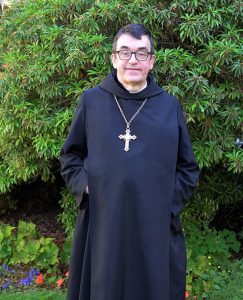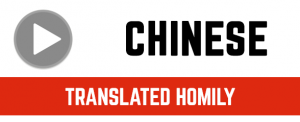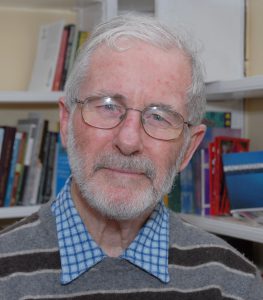In the past, I’ve been open about my father’s faults and mistakes such that a few people have the impression that I don’t really love him. So, allow me to clarify: I do love my father. I’m deeply grateful that he gave me a sense of justice, a love for classical music, freedom to follow God, but most importantly, he loved me and I felt it. So, when I bring up my father’s mistakes, there’s no lack of love on my part.
Let me ask you about your father: When you think about your own father’s strengths and weaknesses, are you too easy on him or too hard? I’m focusing on fathers because today’s Gospel is about Jesus the Good Shepherd and this speaks in a special way to the heart of men. Today’s also the World Day for Vocations specifically to sacred orders and consecrated life, and so I’m going to focus on three priests I’ve known. (In three weeks, on Mother’s Day, I’ll focus on women.)
It’s helpful to have objectivity with regard to our fathers. Our model for fatherhood is Jesus. Therefore, when our fathers follow Him, great; we can thank and imitate them! But, we need to be aware when they don’t follow Him, so that we’re not misled.
Jesus says, “I am the good shepherd. The good shepherd lays down his life for the sheep. The hired hand, who is not the shepherd and does not own the sheep, sees the wolf coming and leaves the sheep and runs away… because a hired hand does not care for the sheep” (Jn 10:11-13). There are inscriptions from the ancient Near East, on which kings of Babylon and Assyria referred to themselves as shepherds, because it was their duty to protect and rule. The Jewish people also saw God as their shepherd, but the distinguishing characteristic that they eventually came to understand was that the shepherd would die for his flock and then rise again. In essence, a good shepherd, and a good father, is not only someone who takes care of us, but who dies for us.
My father loved me, but I can’t say he laid down his life for me. I don’t think he ever thought about that. While he loved our family and made sacrifices for us, his primary pursuit in life was making himself happy. To lay down one’s life means to live primarily for others: to sacrifice our life, dreams, even health for the good of others.
This is Fr. Frank Doyle, S.J.:
I met him when I was 14 and loved talking to him. I remember one time just walking up to the rectory and knocking on his door to talk, not knowing that he had a schedule! He told me how he joined the Jesuits when he was 18 and left Ireland to go train in the Philippines, and didn’t see his family until 10 years later. That sacrifice captivated me: That someone would give his life to God so that people halfway around the world could live! Also really cool was that he spent most of his mission in Hong Kong, so when we went out for Chinese food, the waitresses were amazed at how well he spoke Cantonese!
Consequently, when I first encountered the reality of a shepherd laying down his life so that others could live, that spoke to my heart. That’s what life is about! I want to be like that! That’s what fatherhood is about.
And there are a number of fathers here who, I know, live like this. Look at and talk to Deacon Andrew.
Jesus contrasts the way He loves with the hired hand. The hired hand isn’t a bad person, like the thief of whom Jesus speaks before (Jn 10:10). The thief kills, but the hired hand just runs away when there’s suffering. Can we think of fathers who, in some way, run away when there’s suffering?
It’s more common for fathers to leave their children than for mothers. And then it’s more common for young men to check out and not take responsibility. It’s rare to see a young woman wasting her life on video games and living off her parents; she tends to have a job and volunteer. It’s more common to see men not fulfilling their potential and not ready to be fathers.
Consequently, Jesus’ contrast between the good shepherd, the thief, and the hired hand makes us think about three ways men can live: as a protector, predator, or possum. He says, ‘The hired hand… sees the wolf coming and leaves the sheep and runs away… because a hired hand does not care for the sheep.’ God gives us the choice to care for others. One of the most beautiful decisions in life for men to make is to care for others. So, this is hopeful.
My brother, Fr. Garrick, told me something a few years ago: Our Dad never taught us to be responsible, so, for example, I would watch about four hours of TV a day, always hand my homework in late, etc. Yet, deep down, I did want to help others. Fr. Garrick told me that, when he was in UBC and before he entered the seminary, he promised himself that he would never be without a job, because Dad was without a job for years, and he didn’t want to be like that. Therefore, he chose a different way. Now as a priest, he’s super responsible and dedicated. When I asked him if he ever thought about coming back to Vancouver, he responded that his heart is with the Quebec Catholics and he’s there to serve them.
Finally, Jesus says, “For this reason the Father loves me, because I lay down my life in order to take it up again. No one takes it from me, but I lay it down of my own accord. I have power to lay it down, and I have power to take it up again” (Jn 10:17-18). The sacrifice Jesus offered wasn’t thrust upon Him from the outside. The sacrifice He gave us was a free choice. This brings us to the reality of being able to choose to love like God the Father: The Father loves Jesus because Jesus loves the way the Father does! And, by His grace, we can choose to do the same! No one forces us to be a protector or take responsibility. We get to choose freely to give up our own plans so that others can live. For this reason, the Father loves us.
The question Jesus poses to us, particularly men, is: I laid down My life so that you could live. In what way can you lay down your life so that others may live?
There are many other spiritual fathers I could tell you about, but here’s the third: 
P. Alban Riley OSB has been my spiritual director since 2001. He has a completely different personality than I: dispassionate, patient, bookish. So much of what I give you has come from him: If you’re discouraged and overwhelmed, I try to put things in perspective; if you’re overreacting, I’ll try to keep you balanced. Father always gave me the truth, told me what was a sin and what wasn’t, and gave me time to think it over. He’s so intelligent (speaking at least 5 languages) that he always gave me well-researched opinions and never overreached. Years ago, I told another monk, ‘He saved my life,’ because he gave me Jesus’ truth and goodness during a time when I was struggling.
None of the priests I’ve mentioned are perfect; I’m aware of their faults and try not to follow those. The point is: Our model is Jesus, so let’s imitate only the good qualities of our fathers, and especially choose to lay down our lives for others.


